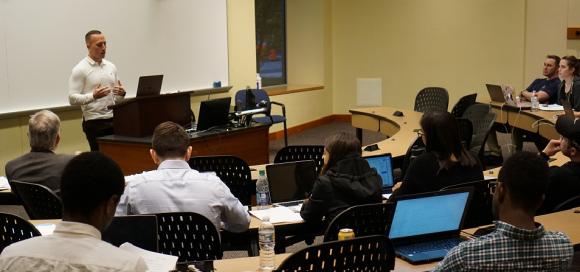
Students learned about limited liability companies from experts that included the Vice Chancellor of the Delaware Court of Chancery.
When Professor Jacob Russell launched a new business law class on Advanced Business Organizations that focused on teaching the laws of limited liability companies, he and co-teacher, the Hon. J. Travis Laster, Vice Chancellor of the Delaware Court of Chancery, had to design most of the course from scratch.
That’s because though LLCs have taken the business world by storm, most law schools have not yet caught up by teaching about them.
“This is very comprehensive coverage of a fairly new type of business entity,” said Russell. “From talking to practitioners we know that this is the kind of thing we wish young lawyers knew.”
Russell explained that LLCs may be mentioned in business law classes, but the topic is not covered in depth, despite LLCs having grown to be the most popular structure for business formation in recent years. Small businesses are attracted to LLCs because they can be cheaper to form and have more flexible governance structures than corporations. More complex deals also frequently use LLCs and limited liability partnerships because of their flexibility and tax advantages.
Russell said students benefitted from having Vice Chancellor Laster in the classroom. He is a highly respected jurist on the Chancery Court in Delaware and has deep expertise in LLC litigation. The bulk of Fortune 500 companies make Delaware their legal home, and the state and its Chancery Court are well-known for business litigation in the country.
“It’s like having the Constitution taught to you by a U.S. Supreme Court justice,” Russell said of Vice Chancellor Laster. “He actually wrote many of the cases the students are reading. He has a level of openness and honesty about the judicial decision-making process.”
The Rutgers Law School course, which started in January in Camden, covered the full life cycle of an LLC. Topics included the history of the LLC statute, how LLCs differ from corporations, how to form an LLC, how to structure and manage an LLC, how disputes are resolved, litigation issues involving LLCs, and how an LLC is terminated.
The course was popular from the beginning, with 25 students, the maximum allowed in a skills course. To provide hands-on skills experience, the course included regular contract drafting assignments, as well as a mock litigation exercise.
“I wanted to take this course because of my general interest in business law, particularly entity formation and governance,” said Gabriel Bedell RLAW ‘20. “Throughout the semester, we read through and analyzed most of the Delaware Limited Liability Company Act. We also read through provisions in several operating agreements, the governing document of each LLC. With this holistic approach, we were able to gain insights into the transactional and advisory side of practicing Delaware LLC law as well as the litigation aspect.”
Bedell said the class will help him practice business law.
Vice Chancellor Laster said he enjoyed co-teaching the course and believes the topic is valuable for future business lawyers, “LLCs are a fundamental part of business law, so the information is something students should learn, just like they learn about corporations, contracts and tax.” He added, “Lawyers of all types will come into contact with LLCs. It’s important to know the basics of how they function, which is not always intuitive.”
The course exemplifies the strength of Rutgers Law School in business and corporate law. Beyond robust curricular offerings, the Center for Corporate Law and Governance hosts regular events in both Newark and Camden that draw practitioners, government officials, and students. Last spring, Vice Chancellor Laster was the speaker at Rutgers Law School’s Distinguished Lecture in Corporate Law.
Heather O’Brien RLAW ‘19, who was in the inaugural class, explained, “We drafted sections of an LLC agreement, discussed cases that Vice Chancellor Laster presided over, and learned about the unique structure that LLCs and LPs can take...We were able to hear firsthand how laws governing these alternative entities play out in real life and in the courtroom.” She said the class was “extremely useful” because students gained practical experience they can use as lawyers when drafting agreements and working with clients.
Russell said the class filled a gap in the law school’s business courses and is something he’d like to offer again, “It’s a very practical course...We looked at real-world cases, and the finance and business side of it, not just the law side of it.”